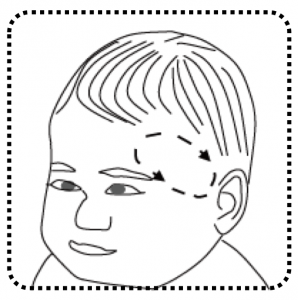
My child is unwell - when should I see a doctor?
Written 01/05/2022 – Last major review 13/02/2024 – Last minor review 01/03/2024 – Next mandatory review by Feb 2026
Click on subject in CONTENT to go straight there and click on subject in the TEXT to go back to CONTENT
Content
If you want to know:
Do I need to see a doctor for my child now?
After an appointment when do I need to go back to see a doctor again?
When is it a fever / low temperature?
Can you get safe advice through exchange of text messages only?
Conditions which should prompt you to take your child immediately (within a few hours) to a doctor:
Checklist for parents of most common reasons to see a doctor immediately:
Conditions which should prompt you to take your child to a doctor next day (next 12-24 hours):
I often get a text message from parents especially at times when medical advice is difficult to obtain:
“My child has a fever of over 40ºC, when do I have to worry?”
or
“My child has been unwell for 4 days; do I need to do anything now?”
Many parents understandably want someone else to help reassuring them: “Yes all is fine!”
At other times another doctor or I have assessed your child recently and decided the child is able to be looked after at home but he or she has become worse since then and when should you worry again?
“When should I return urgently to see a doctor again?”
A fever is a temperature over 38 ºC best measured with a digital thermometer in the mouth or under the arm, an ear thermometer in either ear or an infrared thermometer over the forehead.
A low temperature is if your child’s temperature is below 36 ºC.
In children under 3 months, I would advise to seek immediate medical advice if the temperature is 38 ºC even if measured rectally.
In children > 6 months the degree of temperature alone is not a good indicator whether there is something seriously wrong or not as many viruses can cause temperatures of 40 ºC and over.
A low temperature unusual and in my experience often registered through incorrect measurement. However if you cannot be sure or the temperature remains low despite repeated measurements and/or with different thermometers you should seek immediate medical advice.
But remember always trust your instinct and if you are worried let a doctor review your child even if you have had a recent review.
See separate advice on if your child has fever and you do not need to see a doctor urgently:
Acute viral illness: What can I do? see: Should I give something for fever?
- Tip: Rectal temperatures can be 0.5-1.0 ºC higher.
- Tip: If you are not sure then measure the temperature two or three times and or with different devices and if it varies more than 0.2 ºC each time there are likely some measurement errors (common with ear thermometers in small children).
- Tip:

I find infrared thermometers are more accurate if pointed at the side of the forehead which is called the temple area — there is an artery running relatively close under the skin and the temperature of the overlying skin is reflecting the central body temperature better than the skin of the forehead.
For unwell children it is impossible to give safe advice without careful further history which is invariably a lengthy exchange of texts back and forth and in almost all cases dangerous to do with texting alone and would need a full history as a bare minimum but normally a full physical examination as well.
Therefore, the answer may be:
“Yes you should get your child seen urgently!”
or
“It seems unlikely that you must take your child to see a doctor now but if it changes or worsens than yes!”
What are certain features when I personally would advice to see a doctor urgently (i.e., immediately take your child to an Emergency Department, Urgent Care, GP or to an emergency clinic):
1. You are
- worried your child may be very sick
- not sure whether your child is very sick or not
2. A fever / low temperature if your child is
- under 3 months and has a temperature over 38 ºC (*)
- under 6 months and has a temperature over 39 ºC
- under 6 months and has a temperature over 38 ºC and you are not sure how unwell your child is
- under 18 months and has a temperature over 38 ºC and is not fully immunised
- not fully immunised at any age and unwell or you are not sure how unwell your child is
- immunocompromised (significantly reduced immune system) or on chemotherapy for cancer
- any age if the temperature is below 36 ºC should be treated as a potential medical emergency (see above “When is it a fever / low temperature?)
(*) if you see me in clinic with a child less than 3 months old who has a fever I will always refer you to a unit which will observe your child and is able to treat your child with intravenous antibiotics after a series of tests.
3. Your child
- has pauses when breathing (apnoeas)
- is breathing very fast and/or laboured and / or is grunting
- you can see or you think your child is struggling to breathe and/or talk
- is under 1 year old and takes 60 breaths or more in 1 minute
- is over 1 year old and takes 50 breaths or more in 1 minute
- makes a loud noise from their throat when breathing in (stridor), (especially with drooling or high fever >=39 ºC)
- has become pale, mottled or feels cold to touch
- is going blue around the lips or tongue
- has not passed urine 3 times or more in 24 hours or none in the last 8 hours without being able to pass urine when asked
- you have not been able to observe any urine for 12-24 h due to severe diarrhoea
- any baby who is not interested in feeding
- a baby or child who
cannot be encouraged to drink for 8 hours while awake
has green (bile stained) vomits
vomits with every feed, drink or food for more than half a day - a child who is becoming increasingly thirsty and is passing a lot of urine (maybe developing diabetes)
- your child under the age of 2 years has been crying inconsolably or longer than 90 minutes
- is refusing to weight bear or walk at all
- had their first fit or seizure
- has an unusual seizure compared to previous seizures
- has become confused / very lethargic or unresponsive
- has not had at least one alert episode (cannot be interested in any activity) in 24 hours during the current illness
- talks nonsense or gibberish with or without a fever
- develops a non-blanching rash {rash that does not disappear with pressure (glass test)}
- any head injury from a fall in a child under a year of age
- has symptoms listed on the head injury advice sheet (see Parent Information: Accidents) after a head injury
- any testicular pain in young boys and especially teenagers
If the answer is yes to any question below you should take your child to be seen immediately (next ½ – 4 hours):
O Is my child under 3 months and has fever?
O Has my child been lethargic for 24 hours without a period of being alert and to some degree interested in activities or surroundings?
O Have you seen a rash which does not blanch or does not go away with the glass test or are you unsure whether it does or does not?
O Has your child passed less than 3 times urine in 24 hours, or you cannot be sure?
O Are you very worried about your child’s breathing?
O Is our child under the age of 1 year and sustained an injury or head injury?
O Has your child had a first seizure, or you are not sure whether it may have been a seizure?
O Is your child talking gibberish, is confused or is not making sense?
O Are you very worried about your child?
Please do understand that it is always impossible to give 100% reliable advice whether your child needs to be seen without having taken a full history and most of the time without having examined the child in a face-to-face consultation. Any advice given is to the best of the ability of a doctor given the circumstances but if you continue to be concerned or the situation is worsening you must take your child to be seen immediately.
What are certain features when you must see a doctor soon and usually next 12-24 hours (You should be able to take your child to see your GP or to an emergency clinic):
- Your child is working hard to beath (indrawing below or in-between their ribs or in the neck or fast breathing up).
- Any fever for more than 4-5 days
- A child that has not been interested in the surroundings or looked alert over a 24-hour period but has remained responsive (see also red box)
- Blood in stool (poo) or urine (wee)
- New onset of limping without trauma
- Vomiting over 5 times a day
- Persistent pain after an injury
- Fever in an unimmunised child and your child is looking well
- You are worried your child is not getting better from a recent illness
